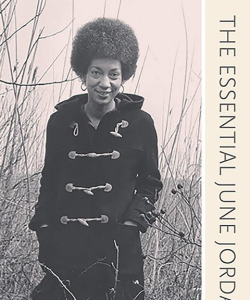The Legacy of June Jordan

An excerpt from The Essential June Jordan, edited by Jan Heller Levi and Christoph Keller and published in May by Copper Canyon Press.
Jump to navigation Skip to content

An excerpt from The Essential June Jordan, edited by Jan Heller Levi and Christoph Keller and published in May by Copper Canyon Press.
“There’s a sister who works so hard she never talks. / A sister who screams when she hears dogs bark.” Monica Sok reads “Sestina” from her debut poetry collection, A Nail the Evening Hangs On (Copper Canyon Press, 2020), for Women Warriors: A Solidarity Reading, presented by the Asian American Writers’ Workshop, which featured over forty Asian American women writers.
In an afterword to The Essential June Jordan, edited by Jan Heller Levi and Christoph Keller and forthcoming in May by Copper Canyon Press, Pulitzer Prize–winning poet Jericho Brown writes about how the legacy of June Jordan, who died in 2002, “allows another opportunity to think not only about what poems are, but also what poems can do.” In this definitive volume the celebrated poet’s voice shines as she explores difficult subject matter, such as racist police brutality and violence against women, with a commitment to global solidarity and radical kindness. She dedicates many of her poems to lovers and friends, along with historical and pop culture figures, including “1977: Poem for Mrs. Fannie Lou Hamer,” “Poem for Mark,” and “Poem on the Death of Princess Diana.” Taking inspiration from Jordan, write a poem that is dedicated to a single person. Consider using your new poem’s title to help frame a complicated subject.

“There’s something sort of final and fulfilling about discovering, say, that a poem’s floor is also its ceiling.” —Justin Jannise, author of How to be Better by Being Worse
“I wanted to continue to participate in that tradition of hope-making in every single poem that I wrote,” says Amanda Gorman about frequently listening to Maya Angelou’s inaugural poem “On the Pulse of Morning” in this conversation with Oprah Winfrey for Apple TV Plus.
Arts + Literature Laboratory is a community-based contemporary arts center in Madison, Wisconsin. The center supports visual and literary arts, music and performance, and youth and adult arts education through an active calendar of exhibitions, readings, concerts, and educational programs, including a monthly reading series. The 10,500 square foot space in Madison’s downtown Capitol East District houses galleries and performance space, a writing center and small press library, artist studios, and a dedicated education studio.

In Tomas Tranströmer’s lyrical autobiography Memories Look at Me (New Directions, 2011), translated from the Swedish by Robin Fulton, he describes his high school experience of reading the work of Horace out loud in the original Latin and instantaneously translating it into English. “This alternation between the trivial and decrepit on the one hand and the buoyant and sublime on the other taught me a lot,” writes Tranströmer. “It had to do with the conditions of poetry and life. That through form something could be raised to another level.” Write a poem with a central moment or image that risks being ridiculous. How can form be used to tether that moment to a more sublime mission? For inspiration, read “Old Man Leaves Party” by Mark Strand and “The Indoors Is Endless” by Tranströmer.
“The storm funneled through town with destructive intent. / Fractured tree limbs, toppled fences, rippled shingles / like tufts of hair.” In this PBS NewsHour video, Fady Joudah reads “House of Mercury” from his poetry collection Tethered to Stars (Milkweed Editions, 2021), which is featured in Page One in the March/April issue of Poets & Writers Magazine.
“My mother doesn’t write recipes, / she just knows. // Braised pork and eggs, / rice cleaned thoroughly.” Joshua Nguyen, author of the chapbook, American Lục Bát for My Mother (Bull City Press, 2021), reads two poems in this video for the Write About Now Poetry reading series in Houston.
The deadline is approaching for the Cave Canem Poetry Prize. Founded in 1999 to help discover “exceptional manuscripts by Black poets of African descent,” the prize celebrates a debut book of poetry by a Black writer. The winning writer will receive $1,000, a critique session with the prize judge, publication by Graywolf Press, fifteen author copies, and a reading event.
Using only the online submission system, submit a cover letter and a manuscript of 48 to 75 pages by April 30. Only writers who have not published a full-length book of poetry are eligible. Writers who have published chapbooks or who self-published books with limited print runs are eligible. Rachel Eliza Griffiths will judge. There is no entry fee. Visit the website for complete guidelines.
The Cave Canem Foundation was established in 1996 with the ambition to “remedy the under-representation and isolation of African American poets in the literary landscape.” Cave Canem’s many programs include an annual writing retreat and numerous community-based workshops. The winner of the 2020 Cave Canem Poetry Prize was Aurielle Marie, whose book, Gumbo Ya Ya, is forthcoming from the University of Pittsburgh Press in fall 2021.